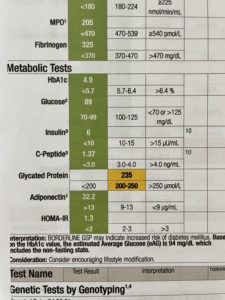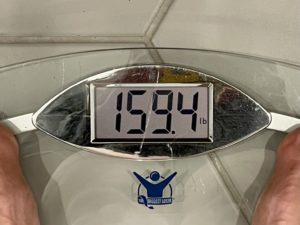As is evidenced by my Project 135 stats below showing a stagnant weight, I have been on the sugar train this week thanks to me using my birthday on January 25 as an excuse. And I noticed the last few days that my legs and back are killing me. I’ve had problems with my low back for a long time and an MRI about 3 years ago showed degenerative disc disease, spinal stenosis, and a bad ruptured disc pressing on my lumbar nerve roots (explaining total numbness in my right leg and weakness in my right foot). Since then I’ve struggled with chronic low back pain and occasional sciatica. I’ve also developed issues since buying my Peloton a year ago — somehow riding the bike seems to exacerbate my back pain, and has also created issues in my left knee and hamstring over the past few months. Well, this week the pain has been pretty terrible. Like, my legs and low back/hip girdle hurt constantly, and if I sit for more than a minute and then try to get up, I let out the old lady moan and have to go super slowly for the first few steps because I’m “all stove up” (stuck and unable to move), as my late father used to declare. It’s disrupting my sleep, too, because the pain literally wakes me sometimes and makes it hard to get back to sleep.
Why is my pain so much more noticeable this week? My sleep quality has been shit, that’s for sure. Going to bed with a full stomach, and specifically a stomach full of sugar (to make it worse), has left me with an elevated resting heart rate, depressed heart rate variability, and multiple awakenings through the night. I’m sure that’s not helping my pain. But I know I’ve read many places that refined sugar increases inflammation in the body (and inflammation triggers pain receptors), so I started wondering last night whether all the sugar this week is literally making my musculoskeletal pain worse.
There are lots of blogs about it, but not a whole lot of research. I found one meta analysis that found no significant worsening of the inflammatory marker high-sensitivity C-reactive protein, or hsCRP, when people are fed fructose or high fructose corn syrup compared to glucose. This doesn’t really tell me if added sugar (of any type, whether fructose, sucrose, or glucose) vs. NO added sugar is different when it comes to inflammation. Another 2018 review paper titled Impact of sugar on the body, brain, and behavior stated:
Added sugar consumption has also been associated with cognitive impairments, especially worsened hippocampal memory function. Rats on a high sugar/low fat, or a high sugar/high fat diet show hippocampal-dependent memory deficits (61). This relation appears to be mediated by increased hippocampal inflammation, which is especially pronounced in the high sugar/low fat condition (61). Associations in humans support these findings: greater relative carbohydrate intake predicted a heightened risk of mild cognitive impairment or dementia in elderly people, while carbohydrate intake in school children was negatively associated with nonverbal intelligence tests (61).
Another paper titled Do nutritional factors interact with chronic musculoskeletal pain? A systematic review suggested that plant-based diets may improve chronic pain in certain conditions and stated, “pain severity is positively associated with fat and sugar intake in chronic osteoarthritis pain.” And, interestingly, one of the consequences of frequent consumption of refined sugar may be an increase in advanced glycation end products (AGEs)— proteins and lipids in the body that get chemically changed by the addition of a bit of sugar to them (this process is called “glycation“). AGEs may contribute to the development of cardiovascular disease and Alzheimer’s. This paper found a correlation with a person’s level of AGEs and their low back pain severity. And it just dawned on me last night that when I had my fancy Boston Heart blood panel drawn last spring for Dr. Isaacson (in advance of my visit to the Cornell Alzheimer’s Prevention Clinic), while my hemoglobin A1C (HgA1c, or glycated hemoglobin) was low, suggesting I was not diabetic or prediabetic, I actually did have a high level of glycated protein in my blood!

At the time I blew it off, but now, my decrepit old bones are realizing that maybe my excessive sugar intake really is aging me prematurely.
So it seems that there’s suggestive evidence of sugar-induced brain inflammation in rodents, and associations with sugar intake and negative inflammatory outcomes and chronic pain in humans, but honestly the research is pretty sparse. All of the evidence is lower level evidence, some studies showing associations between sugar intake and pain, but there aren’t really any good randomized controlled trials to prove causation. So… I guess I am left to experiment on myself! I know I’m constantly touting the benefits of avoiding added sugars, but there’s nothing like experiencing hella pain for a few days to make you want to do something to take you out of your misery. I’m cooking a nice anti-inflammatory tomato bean soup this weekend and focusing on plants and whole foods while I observe how my sleep and body feel. Fingers crossed that my back and legs hurt less by next weekend!!
Have you noticed that your pain is worse when you’re eating crap? Let me know your experiences in the comments!
xo Jen
Project 135 (resurrected) stats:

week 0 (Jan 1, 2022): 164.4 lbs
week 1: 162.2
week 2: 160.8
week 3: 159.2
week 4: 159.4
Total weight loss: 5 lbs (3%)

